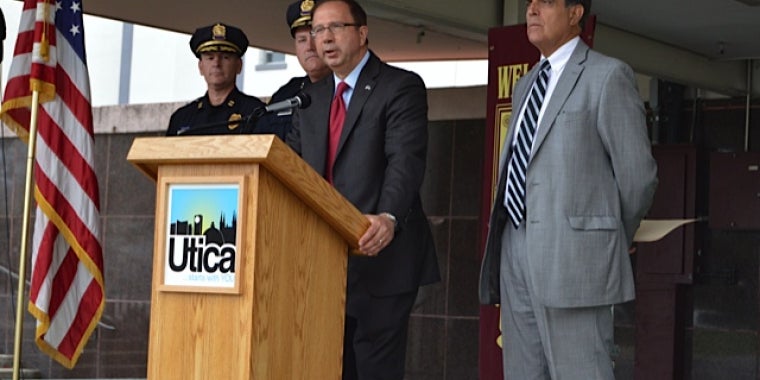
Griffo Secures $60,000 for Utica Police Department
Joseph A. Griffo
August 28, 2014
-
ISSUE:
- Cities
- Crime
- Local Government
- Law

UTICA – Utica police officers will soon be wearing body cameras, thanks to a $60,000 grant secured by Sen. Joseph A. Griffo, R-Rome.
“Putting a camera on an officer serves a dual purpose,” said Griffo, R-Rome. “The recording could aid prosecutors in collecting evidence against a criminal. But it also provides a measure of accountability. If a member of the community believes they were mistreated by an officer on duty, the officer’s superiors can consult the videotape to see what transpired and take appropriate action, if necessary.”
Griffo said Utica Police Chief Mark Williams requested state funds so that purchasing the cameras would have no impact on the city budget or taxpayers.
“The department suffered a great loss when Officer Thomas Lindsey was senselessly murdered. I believe body cameras will make each officer’s job safer, so I was happy to assist this department by securing these funds,” said Griffo.
The department will soon begin a pilot program so that cameras from three different manufacturers can be tested before a purchase is made. The funds will cover the cost of cameras for about 80 officers, Chief Williams said.
“On behalf of our department, I thank Senator Griffo for helping us purchase this equipment without having to burden the taxpayers,” said Chief Williams. “These funds will be used to equip to our uniform patrol division, which interacts the most with the public. The cameras will go a long way to protect our officers and our city from liability, to assist our district attorney with gathering evidence, and to assess the legitimacy of personnel complaints.”
“Once again, Senator Griffo has stepped to the plate and provided valuable resources to the city of Utica,” said city Mayor Robert M. Palmieri. “These body cameras are another tool to help our law enforcement personnel. I thank the senator for his advocacy for the Utica Police Department and the city as a whole.”
The funding comes from the Edward Byrne Memorial Justice Assistance Grant program.